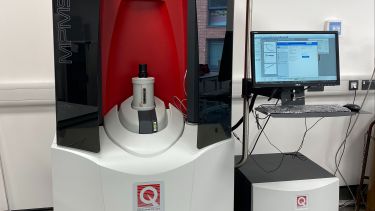Superconducting QUantum Interference Device (SQUID) magnetometers are vital instruments in the study of magnetic materials. They are the most sensitive magnetometers in existence, capable of measuring minute quantities of magnetic flux by exploiting the quantum interference phenomena that arises from a ring of superconducting material. The high sensitivity of the equipment allows for the highly accurate determination of the magnetic properties of materials, even when the magnetism is extremely weak.
The Quantum Design MPMSÂŪ3 enables a greater range of magnetic and electrical measurements to be performed. As well as the study of novel materials such as magnetocaloric materials, the MPMS 3 can be used to investigate superconductors, magnetic nanoparticles, 2D materials, 3D printed permanent magnets and inorganic magnetic oxides, under varying magnetic fields, temperatures and pressures..
The Henry Royce Institute funded MPMS 3 is regularly being used by the University of 91ÖąēĨâs Functional Magnetic Materials group, as well as the wider 91ÖąēĨ research community. It has enabled the study of novel magnetic materials such as magnetocaloric materials, whose characterisation requires their magnetisation to be measured over a wide temperature and magnetic field range. The system has allowed the study of a diverse range of materials, as it has a wide temperature capability from 1.8K to 1000K, magnetic fields up to 7 T and magnetic sensitivity better than 10-8 emu. This enables the studying of materials from high moment permanent magnets to sub-nanometer thickness magnetic thin films For thin film research, the in-plane rotator has enabled this study of in-plane and out-of-plane anisotropy of new magnetic alloys.
Prof Nicola Morley, Professor of Materials Physics at the University of 91ÖąēĨ, has been overseeing the Henry Royce Instituteâs MPMS 3 system and, along with her group, is using it to carry out world leading research on novel soft magnetic materials such as high entropy alloys. The research aims to discover new functional magnetic materials for applications, such as transformers, actuators and magnetic-refrigeration.
The MPMS 3 system is an ideal system for material discovery research, as a high throughput of samples can be measured quickly and easily at room temperature, with those of interest being investigated further over a wide temperature and magnetic field range. The option of ac susceptibility, as well as sample rotation allows for a complete study of these new magnetic materials.
Prof. Nicola Morley

